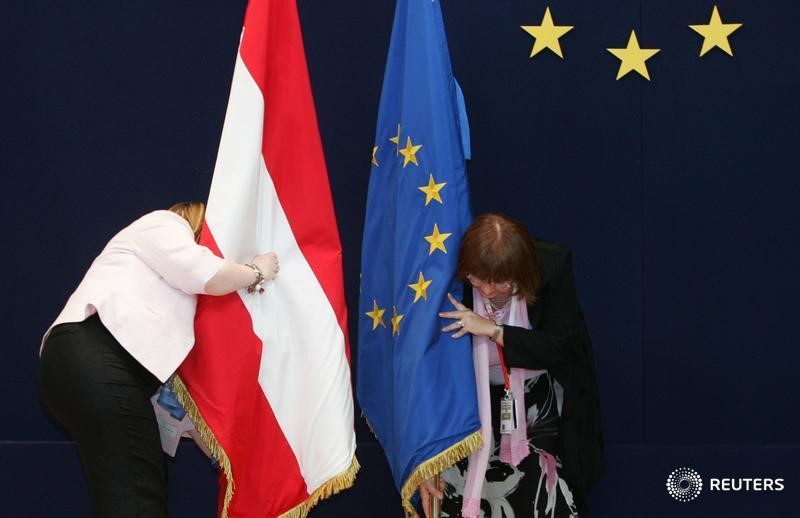By Shadia Nasralla
VIENNA (Reuters) - Ahmed Ali, a 34-year-old teacher, fled the war in Syria two years ago and settled in a quiet Austrian town on the hilly border with the Czech Republic. He was hoping to raise a family there.
But voter attitudes towards immigrants have hardened due to concerns about security and the economy after Austria took in more than 1 percent of its population in asylum seekers in 2015.
This fuelled support for the far-right party Freedom Party and its candidate came close to winning last year's presidential election. Immigration is still the dominant political issue ahead of the Oct. 15 parliamentary election.
In January, lawmakers in Lower Austria, where Ali lived, reduced benefits for new arrivals. They said the benefits system needed protecting from being overstretched by the influx of refugees.
Ali and his pregnant wife moved again to Vienna in July, where their benefits would still be paid in full.
"Most of us fled when the letter came telling us our social benefits would be cut. At first we didn't believe it but then we saw it on our bank balance," said Ali, who says his German is not yet good enough to find work.
Three of Austria's nine provinces -- Lower Austria, Burgenland and Upper Austria -- have reduced benefits for new arrivals. Foreign Minister Sebastian Kurz, leader of the conservative People's Party which is leading in the polls, wants to make similar cuts apply to the whole country.
Chancellor Christian Kern, whose Social Democratic Party polls show competing with the Freedom Party for second place, has resisted the idea but said he could support them in cases where new arrivals turn down job offers.
LEGAL CHALLENGE
So far, the cuts have primarily impacted migrants like Ali who sought asylum in Austria when it opened its border in 2015 although some Austrians returning home have also been caught.
In Burgenland the rules apply to all people seeking help who have spent fewer than five years of the six preceding their application for benefits in Austria.
A statement accompanying the Upper Austrian bill painted the cuts as a way to tackle the problem of "welfare magnetism" in the context of refugees. The Lower Austrian government declined to comment due to a legal challenge against the cuts.
In a case brought by a charity, Austria's Constitutional Court is expected to rule next year on whether the cuts by Lower Austria, decided in late 2016 and implemented since early 2017, are illegal.
The 1951 United Nations Refugee Convention says host countries must grant refugees "the same treatment with respect to public relief and assistance" as their own nationals. A 2011 EU directive sets a similar rule.
The U.N. refugee agency (UNHCR), which has denounced “xenophobic debates” in Austrian politics ahead of the election, has described the cuts as breaches of international and European law but no international cases have been started.
A Burgenland spokeswoman defended the benefits changes, saying they targeted Austrian nationals as well.
"Therefore there is no violation of ... the EU directive and the refugee convention," she said.
A spokesman for Kurz said legislation to expand the cuts would be passed and phrased in such a way "that no doubt for the highest courts will emerge".
BARE MINIMUM
The three provinces have cut benefits for new arrivals, even after obtaining asylum, to around 570 euros (£505) a month, less than half the poverty threshold of 1,200 euros, compared with around 850 euros for an Austrian who has never lived abroad.
Benefits for a household have been capped at 1,500 euros.
Rather than live off less than what is considered the bare minimum for most Austrians, many of those affected have moved, particularly to the capital.
Ali moved to an apartment with his uncle and aunt in a dilapidated building on the outskirts of the city costing 1,100 euros a month.
"They don't care how many children you have. And maybe they'll cut again," Ali said in his living room with two sofas, a television set and a picture of Kurdish leader Masoud Barzani.
He found more affordable apartments but the landlord did not want refugees as tenants. One landlady was concerned social benefits for refugees might be cut in Vienna, too.
"Instead of cutting the social safety net, integration and independence should be supported. We fear that language learning, training and the search for work will suffer if those affected don't know how to pay their rent anymore," said the chief the UNHCR's Austria office, Christoph Pinter.
Although the Freedom Party and Kurz's conservatives have been the most vocal about cutting benefits for new arrivals, the three provinces that have put cuts in place are governed by various two-way combinations of all three main political parties.
But most of those affected who spoke to Reuters fear an election victory for Kurz.
"If Kurz wins, it will be a big problem," said 24-year-old Basel from Deraa in Syria. He moved from Lower Austria to Vienna in July, leaving behind friends and a job as a hairdresser.
He says the cuts paralyse people like him with fear.
"You stop thinking about the future."
